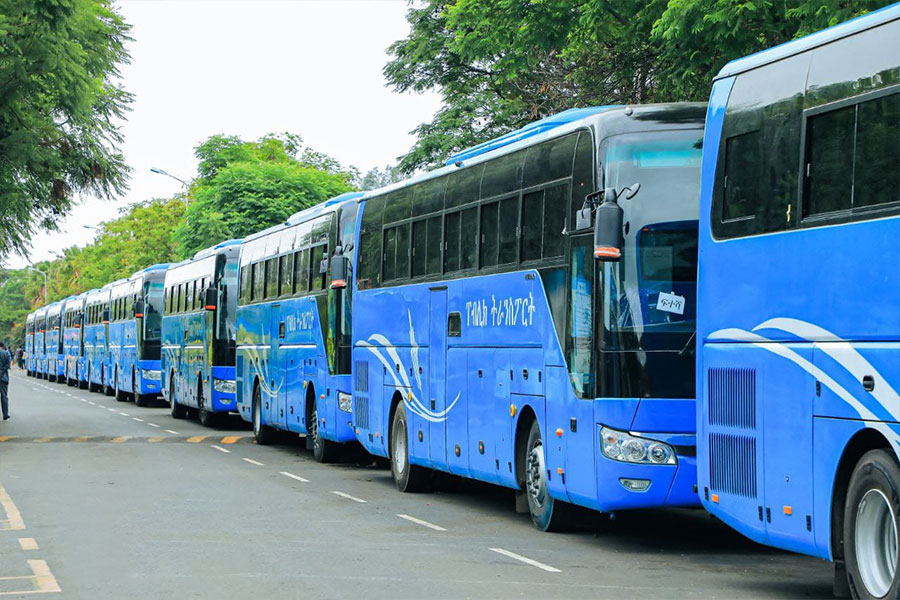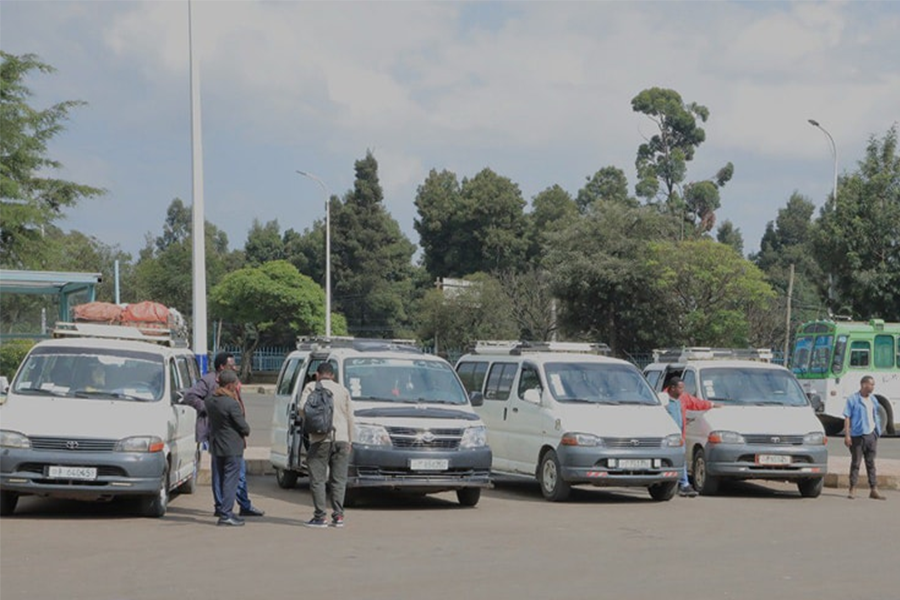
Fortune News | Aug 13,2022
Sep 30 , 2023
By Yasmin Nesre ( FORTUNE STAFF WRITER )
The Addis Abeba Transport Bureau's recent decision to restrict the number of minibus taxi drivers who can transport school children to five per cent per association has sparked outrage among taxi owners.
The decision, penned by respective district heads of transport bureaus in July, was reportedly motivated by a mismatch between demand and supply in public transportation. However, taxi owners argue that the cap is unfair and will have a significant negative impact on their livelihoods and the quality of transportation services available to school children.
The notice urging drivers to prepare alternatives in the upcoming school year, circulating among the 13 taxi associations in the capital had drivers attempt to adapt to the new modality by drawing lotteries to determine which members would offer the service. This method backfired when unlucky members disagreed.
The ripple effects became evident two weeks ago when service providers continued regardless.
According to private minibus owners, they have been penalised up to 1,500 Br for deviating from their assigned routes by the Transport Bureau. Despite their pleas to appeal the cases, it fell on deaf ears and the process kept on being postponed.
While acknowledging the restrictions, officials from the Trasport Bureau declined to publicly comment on the issue. However, the transporters were offered a lifeline to raise their concerns during a meeting hosted at the Mayor's Office, which saw the attendance of officials from various sectors, including Dawit Zeleke, deputy head of the Transport Bureau.
Attendees who voiced their concern about the narrow profit margin noted a sentiment suggesting that recipients of fuel subsidies should prioritise public service.
Nuredin Ditamo is enraged with the new stipulations, which he sees as inconsiderate of the skyrocketing prices of vehicle spare parts and garage maintenance costs.
"We started providing student transport services due to the diminutive profit margins," he told Fortune in a desperate tone.
He manages the 330-member-strong Blen Taxi Association in Bole District and serves as secretary to the Taxi Owners Association. The Association, which used to have 100 of its vehicles providing student transport services, will now have to settle for 24 despite the protests of members.
"Students will be piling on the roads," he told Fortune in a cautionary tone.
Academics within urban transportation circles argue against the imposition of directions on individual property by the Bureau.
"Students are part of the public too," Birhanu Zeleke (PhD) told Fortune rhetorically. The lecturer from Kotobe Metropolitan University suggests that disruptions to the transport sector upset the whole social apparatus.
Birhanu recommends the broader adoption of railways and the strict implementation of regulations that restrict certain roads to public transporters.
"Improving infrastructure is the only solution," he told Fortune, criticising the recent move by the Bureau.
Legal experts have a different outlook.
Yohannes WoldeGerbiel who specialises in commercial law indicates that it is a matter of choosing the lesser evil.
He suggests taxi owners opt out of the subsidy and keep profits or return to providing public transportation which has its own set of rules including tariffs.
"It's not a matter of ownership," he said.
The Bureau regulates permissions for student services by collecting data from the associations on the identity and route of drivers and resending permission letters.
While the association collects 100 Br monthly fees from its members who provide transport services, the rates for student transport are established through negotiations with parents.
Currently, the Association with operations in five districts, is pleading with the Bureau for a year-long extension period. Ayalew Seyoum, who heads the coordinating committee of taxi owners association with 5,000 minibuses under its fleet, deems the whole process rushed.
"It came down so suddenly," he told Fortune.
The committee had also enquired how students already relying on the Mini-Buses would fare under the new restrictions to which the bureau pointed them to the student services provided by the Addis Abeba City Bus Enterprise, according to Ayalew, whose fees for bus transport of students have also increased by 150pc this year.
"Most taxi owners live off that income," Ayalew told Fortune.
Case in point is Melaku Kifle who has been driving a taxi for the past nine years, having provided student transport services for the last five.
He is worried both about his own livelihood and what happens to the 20 students that use his services from the Alem Bank area to Omega School. The 1,000 Br a month Melaku collects from the students is his primary income to support his mother.
Melaku had been betting on the lottery draw for his chances.
"It was disrupted," he said in a devastated tone. He said some options should be provided for drivers who fail to get lucky during the lotteries as punishing everyone will only make things worse.
Melaku acknowledges that drivers wait in front of schools all day which might have prompted the Bureau into action. However, he believes the cases should be addressed on an individual basis
"All of us can't be blamed for what the few have done," he said.
The provision of taxi services is significant with over 8,000 mini buses in the capital. Nearly 11,282 vehicles were used to transport 3.13 million people daily last year.
The mother of three Abeba Taddese has been devastated by the embargo.
She cannot afford to pay the 2,300 Br asked for smaller automobiles for each child, while she used to pay 3,000 Br for all three. The City's bus service does not enter her neighbourhood, which is located 300m off the main road.
Abeba owns a pickup truck with her husband, which is used for their metal and iron works business around the Qera area. While she does not fear the morning drop-offs, Abeba believes that the afternoon pickups will disrupt her work schedule.
"One of us will have to miss work," she said.
PUBLISHED ON
Sep 30,2023 [ VOL
24 , NO
1222]

Fortune News | Aug 13,2022

Radar | Sep 29,2024

Fortune News | Feb 01,2020

Radar | Jul 20,2025

Fortune News | Jun 29,2025

Radar | Jan 22,2022

Radar | Aug 14,2021

Radar | Sep 27,2025

Commentaries | Aug 16,2020

Fortune News | Feb 19,2022

Dec 22 , 2024 . By TIZITA SHEWAFERAW
Charged with transforming colossal state-owned enterprises into modern and competitiv...

Aug 18 , 2024 . By AKSAH ITALO
Although predictable Yonas Zerihun's job in the ride-hailing service is not immune to...

Jul 28 , 2024 . By TIZITA SHEWAFERAW
Unhabitual, perhaps too many, Samuel Gebreyohannes, 38, used to occasionally enjoy a couple of beers at breakfast. However, he recently swit...

Jul 13 , 2024 . By AKSAH ITALO
Investors who rely on tractors, trucks, and field vehicles for commuting, transporting commodities, and f...

Nov 1 , 2025
The National Bank of Ethiopia (NBE) issued a statement two weeks ago that appeared to...

Oct 25 , 2025
The regulatory machinery is on overdrive. In only two years, no fewer than 35 new pro...

Oct 18 , 2025
The political establishment, notably the ruling party and its top brass, has become p...

Oct 11 , 2025
Ladislas Farago, a roving Associated Press (AP) correspondent, arrived in Ethiopia in...